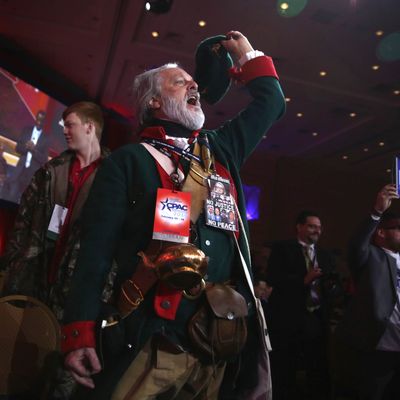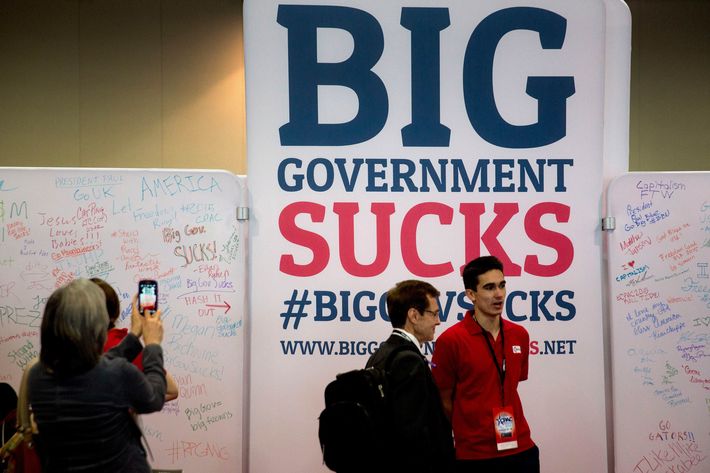
“It’s hard to punch through here,” Travis Brown, a writer for the anti-tax website How Money Walks, is saying. Standing in front of us, a towering silver robot with glowing red LED lights in his eyes and chest plate takes a clunky step forward. “We need to be creative. There’s so much going on.” The robot takes another step forward. A college-aged girl walks by asking who he is.
“Govtron is a robot built and fueled by government inefficiency,” one of the robot’s handlers says. “So he’s armored with pages of the Obamacare bill, he’s got a red tape cannon, he’s stomping on some Gadsden snakes as we speak, stomping on your freedom. We’re pitting this super villain against the How Money Walks Reformers, which includes Captain America and Iron Man, as well as Iron Patriot.” Behind him, a man in a Captain America costume gives a halfhearted wave. “That is so funny!” the girl says. “And what is his name? Goovtron?”
Govtron is the subject of a short comic book Brown authored specially for CPAC, the annual confab hosted by the American Conservative Union. He’s there to direct attention to their website, and right now even he’s struggling to stand out. A few booths away, a limited government youth group called Turning Point USA is blasting Sia while students mill about, tagging their “Big Government Sucks” signing wall. “We’re working around this theme, big government sucks,” says Marko Sukovic, the group’s Midwest field director. “It’s probably the most relevant phrase any young person can relate to on college campuses.”

Behind the wall, on which someone has scrawled, “I love our freedom and dislike big politics,” a man in a “Muhammad is a homo” T-shirt is giving an interview in front of an audience of empty chairs. Three aisles down, at the end of the Gaylord Hotel’s massive expo center, the American Atheists are posted up at a booth with the banner “Conservative Atheists Matter!”
“There are millions and millions of atheists who would be voting Republican if the Republicans would just let them!” David Silverman, the group’s president, says, eyes as big as saucers. “Just ask for our vote! Tell us that we count! Tell us that we matter, once! It’s never happened. Not in my lifetime.” The fresh-faced youth manning the World Congress of Families booth beside them does not know how to deal with the atheists next door. “It’s urrrgh … ” he mumbles until an adult steps in to cut him off.
In a big ballroom upstairs, Ted Cruz, Rand Paul, and Marco Rubio will practice their nascent stump speeches to adoring crowds, and Jeb Bush and Chris Christie — the more moderate and less favored potential candidates in the CPAC straw poll — will get grilled by conservative luminaries like Laura Ingraham and Sean Hannity. With the exception of some awkward jokes, and Scott Walker’s awkward reply to a question about how he would take on ISIS (“We need a leader with that kind of confidence. If I can take on 100,000 protesters, I can do the same across the world,” he tells a questioner), most of the conference’s events are too scripted to be memorable.
Outside the ballroom, there’s a gray-templed fiftysomething man in a suit talking confidently into a news camera. His name is Chris Hill, and he’s an Air Force veteran who’s running for president. “We’re backed by veterans and airline pilots. From that standpoint we’re over 6,000 people on social media and we’re growing,” he tells me. “Veterans offer an opportunity for different leadership in this country. From day one I think I’m more prepared to be commander-in-chief than everyone in this race.” This is not his first time running for president on a platform of term limits and tax reform. Hill ran in 2011, ending his campaign after 90 days, but he was heartened by his results. “From August until January I was able to reach second-tier status with Buddy Roemer and Gary Johnson, two governors! We made a difference in 90 days, but obviously only one person gets to be a Republican nominee.”
It’s clear why Hill and the Govtron and the college kids and the atheists and even the top-tier candidates have come to CPAC — to get attention for their causes and campaigns. What’s less clear is what the rest of us, namely journalists, are doing, besides lining up to interview the first guy we can find wearing a tricorn hat and waving a Gadsden flag. The entire event is so overrun with media that before the day was over I was giving interviews about attending CPAC to another journalist.
Really, those interviews should belong to people like Hill. I asked him before he walked off how he planned to break out into the top tier of Republican candidates. “Well, talking to people like you,” he said, matter-of-factly. “I’ve got to be honest, we’re counting on people at the grassroots media level to step up to the plate and foist us up into Fox News, CNN, that kind of coverage.” I, grassroots media member, wrote this down and did my part.





























